June 17, 2025 | 20:54 GMT +7
June 17, 2025 | 20:54 GMT +7
Hotline: 0913.378.918
June 17, 2025 | 20:54 GMT +7
Hotline: 0913.378.918
Passion fruit is a significant crop in Thailand, known for its adaptability to climatic conditions and numerous health benefits. It was first introduced to Thailand in 1955. Initially, commercial production primarily focused on yellow passion fruit, providing raw materials for processing plants.
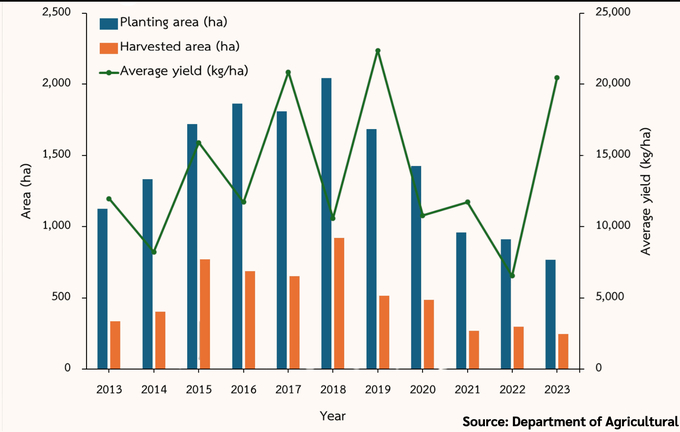
Passion fruit production in Thailand from 2013 - 2023. Source: Department of Agriculture, Thailand.
Passion fruit is not only delicious but also offers many health benefits. Scientifically proven advantages include high fiber content, a rich supply of vitamins and minerals, abundant antioxidants, stress relief, blood pressure reduction, cholesterol reduction, vision enhancement, and immune system support.
The Ministry of Agriculture and Cooperatives of Thailand has encouraged farmers to produce passion fruit following Good Agricultural Practices (GAP) guidelines, a policy officially implemented since 1998. Applying GAP helps Thai farmers enhance the quality of passion fruit, increase competitiveness in the international market, improve product quality, and ensure food safety. Passion fruit produced according to GAP standards holds significant potential as a commercial crop, satisfying the demand for fresh consumption as well as raw materials for processed products.
In Thailand, passion fruit is consumed fresh and processed into various products. Popular items include passion fruit juice, passion fruit jam, and passion fruit-flavored confectionery. The unique flavor of passion fruit is also used in confectionery, creating appealing and nutritious products.
Due to encouragement from the Thai Ministry of Agriculture and Cooperatives and the application of GAP standards, the passion fruit production and processing industry in Thailand is flourishing, bringing high economic value and enhancing the lives of farmers.
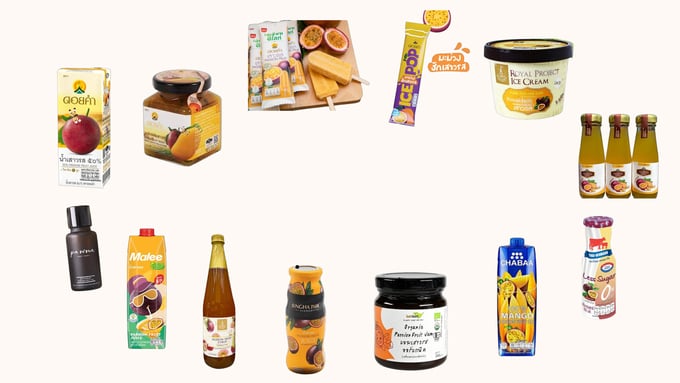
Passion fruit in Thailand is not only consumed fresh but also processed into many different products. Photo: JC .
Recognizing the potential for passion fruit development, the Royal Project Foundation began promoting passion fruit as a commercial crop to farmers in project areas in 2005, encouraging the expansion of cultivation and market development.
Today, passion fruit is an integral part of Thai agriculture, offering economic value and contributing positively to public health. The development and promotion of passion fruit have improved the lives of many farmers while providing a rich source of nutrition for consumers.
Farmers participating in the Royal Project Foundation and Highland Research Development Institute network are mainly concentrated in the northeastern provinces of Thailand. They mainly grow the Tainong passion fruit variety because it is suitable for the area's climatic conditions.
In addition, in northern Thailand's midland provinces, farmers grow Tainong and RPF No. 1 varieties. These varieties have proven to be well-adapted and yield high yields.
Another major variety in Thailand is the purple passion fruit called Passiflora edulis. The fruit is dark purple, with smooth, glossy skin when ripe. The flesh is yellow and sweet, with a better flavor than the yellow passion fruit varieties, low acidity and a pleasant aroma. This variety is suitable for fresh eating and has larger fruits, giving high yields.
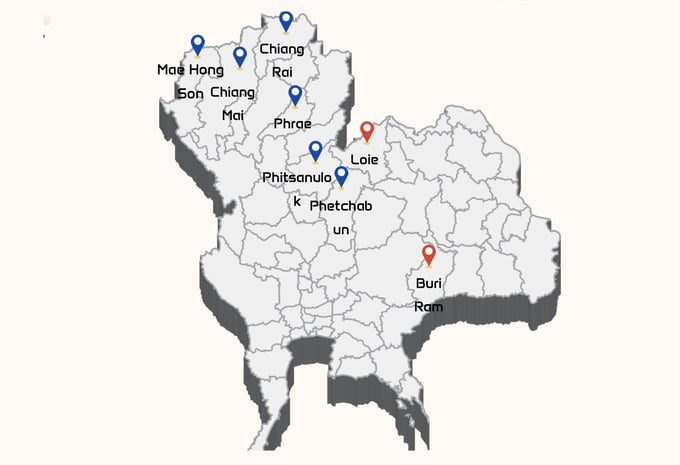
Main passion fruit growing areas in Thailand. Photo: JC .
In addition, the Passiflora flavicarpa Degener variety is commonly grown in low-lying areas in the tropics. The fruit has a saffron-yellow skin and is shiny when ripe, and the juice has a rather sour taste. This variety is suitable for processing and making juice, with good resistance to diseases and insects, along with a unique aroma.
Hybrids have also been developed from crosses between yellow and purple passion fruit varieties. These varieties have large fruits and a long harvest period, with good disease resistance. The fruit has a thin skin and many seeds, and the hybrid produces both yellow and purple fruit, with the surrounding flesh being either yellow or orange.
Passion fruit from the Royal Project Fund and the Highland Development Research Institute has many outstanding strengths. Passion fruit products are graded to high standards, ensuring consistent quality. Plant varieties are carefully selected, and seedlings meet the highest quality standards, helping to improve productivity and fruit quality. Farmers also receive support and professional advice from qualified agricultural extension officers, assisting them in applying advanced and effective farming techniques.
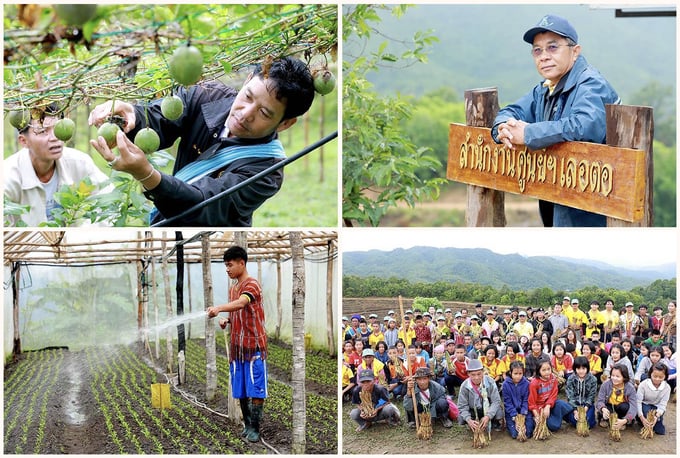
The Royal Thai Project Foundation has improved mountainous people's lives and farming techniques. Photo: Nation Thailand.
The Royal Project Foundation's distribution system is robust and extensive, ensuring that high quality and safety standards are maintained. Passion fruit is harvested when it is 70-80% purple, ensuring a delicious flavor and attractive color. Occasionally, calcium carbide or 48% ethephon (5ml per liter of water) is used to speed up the ripening process and make the skin color more uniform. However, many farmers still allow the fruit to ripen naturally until fully ripe before shipping it to the processing plant.
At the Ler Tor Tak Royal Project Development Center, cultivating Taiwanese passion fruit varieties has yielded encouraging results. The center is located in Mae Tuen Subdistrict, Mae Ramat District, Tak Province - an area with steep mountainous terrain at an altitude of 500-1,200 meters above sea level. The average year-round temperature is 21°C, which is ideal for growing passion fruit.
Most of the new varieties being tested are hybrids from other countries, especially Taiwan. Taiwanese breeders have developed several new varieties with outstanding characteristics such as virus resistance, sweetness, low acidity, and self-pollination.
Five passion fruit varieties tested here all showed high survival rates: Tainong (95.12%), Hongxinniang (100%), Qingxin (91.89%), Huangtianwang (96.77%), Chuntao (90.00%).
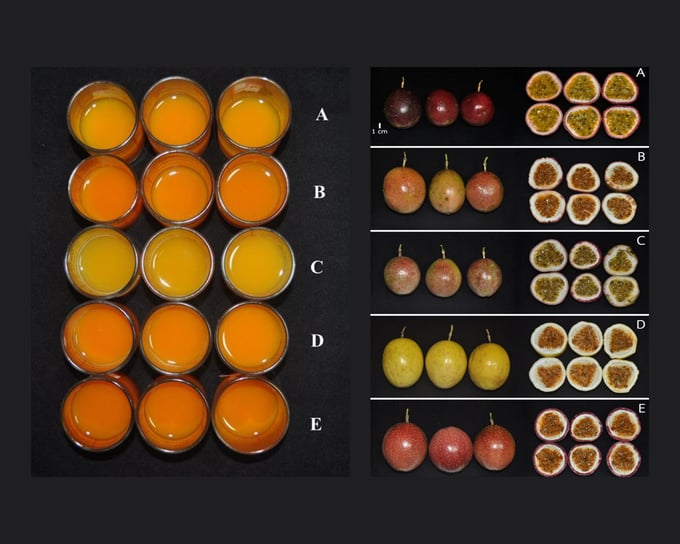
Juice color (left), peel and pulp (right) of five Taiwanese passion fruit varieties: A) Tainong B) Hongxinniang C) Qingxin D) Huangtianwang E) Chuntao. Photo: JC .
The Royal Project Foundation has established six standards for passion fruit products, ensuring quality and size suitable for the market:
- Premium grade: Fruit diameter from 5.0cm or more and fruit weight from 100g or more (8 - 10 fruits/kg).
- Type 1: Fruit diameter from 4.0 - 5.0cm and fruit weight from 80 - 99g (10 - 12 fruits/kg).
- Type 2: Fruit diameter from 4.0 - 5.0cm and fruit weight from 70 - 79g (12 - 14 fruits/kg).
- Type 3: Fruit diameter from 4.0 - 5.0cm and fruit weight from 60 - 69g (14 - 16 fruits/kg).
- Type 4: Fruit diameter from 3.5 - 5.0cm or fruit weight from 50 - 59g (17 - 20 fruits/kg).
- Lowest quality type: Fruit diameter from 3.5 - 5.0cm or fruit weight from 50g or less (17 - 20 fruits/kg).
Healthy passion fruit varieties are grown from seeds to provide rootstock. When the rootstock plants are 2-3 months old, farmers graft them. The grafted plants can then be transplanted into the growing plot, enhancing yield and product quality.
A-frame and trellis systems require systematic plant arrangement, which simplifies pruning. However, they offer limited space to support climbing vines. Pergola systems are commonly used because they provide more space for climbing plants than other types of trellises. However, the vines and branches in pergola systems are not tightly organized, leading to overlapping, which complicates management and creates disease problems during the rainy season, resulting in low-quality products.
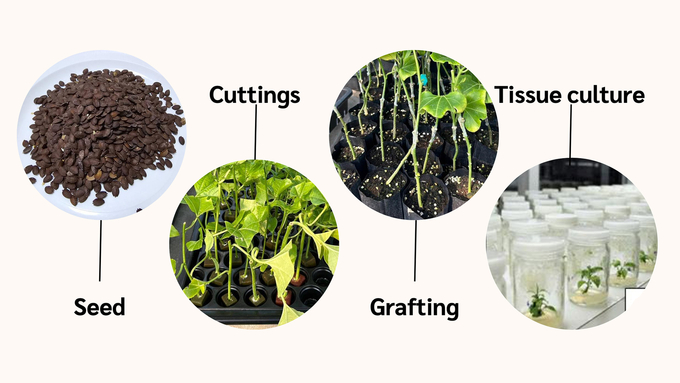
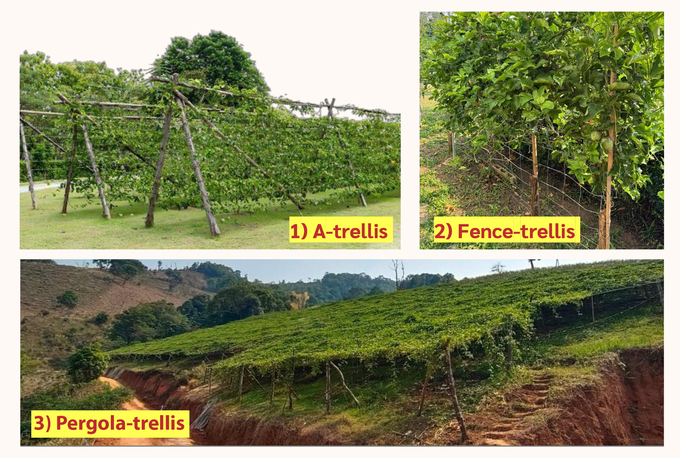
Plant grafting and using net systems in cultivation help improve fruit quality and increase the effectiveness of quality management. Photo: JC.
The Thai Department of Agriculture notes that during the rainy season, when passion fruit trees are flowering and fruiting, the plants are susceptible to rotting due to humid conditions. Up to 40% of the fruit may fall off before ripening, causing significant yield losses. This problem is particularly severe in August and September. An effective solution to control rot is to grow passion fruit in simple greenhouses, which protect the plants from adverse environmental factors and reduce fruit drop.
In addition, passion fruit trees are susceptible to rot caused by the fungus Phytophthora sp. The trees are also affected by viruses such as PWV Virus and CMV Virus, which cause loss of yield and quality. These viruses can be transmitted from grafted branches used to create new seedlings and are easily spread by insects such as Aphis fabae or Aphis gossypii. To prevent this, farmers need to find disease-free seedlings and carefully monitor their passion fruit gardens to detect and control harmful insects.
Passion fruit marketing in Thailand
During the marketing process, passion fruit is classified by traders into three main categories. Category 1 includes passion fruit destined for retail or export chains, which are usually carefully selected to ensure the best quality. Category 2 consists of fruit sold to the general market and usually sent to wholesale distributors at major wholesale markets such as Talad Tai and Si Moom Muang. Category 3 includes passion fruit that is frozen or juiced, serving the needs of food processing.
Passion fruit marketing in Thailand is divided into three main groups of producers. The Royal Project Foundation and the Highland Development Research Institute account for 20% of the market share. Thai farmers in general account for 45% of the market share, while passion fruit imported from neighboring countries accounts for 35%.
Translated by: Quynh Chi
![Turning wind and rain into action: [7] Early disaster warnings help marine farmers minimize losses](https://t.ex-cdn.com/nongnghiepmoitruong.vn/608w/files/news/2025/06/17/z6704423696987_15fd32ffc26d590d204d520c9dac6786-nongnghiep-142942.jpg)
(VAN) In recent years, thanks to early disaster warnings and forecasting, marine farmers in Khanh Hoa province have been able to reduce risks and losses, thereby improving production efficiency.
![Turning wind and rain into action: [5] Hue applies modern technology in disaster forecasting](https://t.ex-cdn.com/nongnghiepmoitruong.vn/608w/files/news/2025/06/17/z6704423696987_15fd32ffc26d590d204d520c9dac6786-nongnghiep-093938.jpg)
(VAN) In Hue city, modern technology has recently been applied in meteorological and hydrological forecasting and warning, helping to reduce the damage caused by natural disasters.

(VAN) A cutting-edge farming technique being implemented on an experimental ranch in Arizona's Sonoran Desert has already saved a billion gallons of water over five years, according to Civil Eats.

(VAN) Poultry and pig production and the environment can be boosted through enhanced water technology, according to new research.
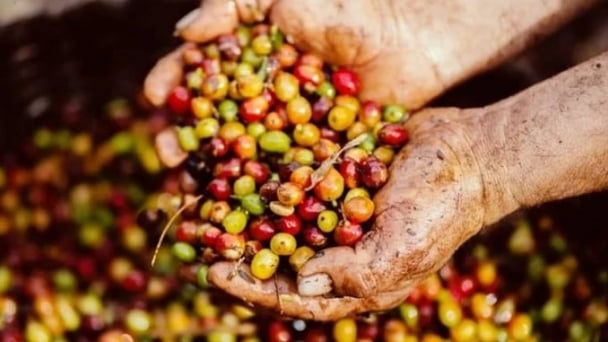
(VAN) Coffee prices on June 16, 2025 are unchanged. In Vietnam, local trading prices are holding steady, ranging around VND 112,000 – VND 112,500/kg.
![Turning wind and rain into action: [4] Bringing climate bulletins to remote and isolated areas](https://t.ex-cdn.com/nongnghiepmoitruong.vn/608w/files/linhnhp/2025/06/14/1152-z6704423696987_15fd32ffc26d590d204d520c9dac6786-nongnghiep-151141.jpg)
(VAN) The Vietnam Agriculture and Nature Newspaper interviewed Mr. Vu Thai Truong, Acting Head of Climate Change and Environment at UNDP Vietnam, to gain deeper insight into how climate bulletins are delivered to farmers.

(VAN) In Tien Giang, a high-tech shrimp farm has developed a distinctive energy-saving farming model that has yielded promising results.